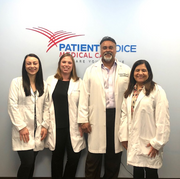
Experts recommend all men should visit their primary care physician for a prostate exam by the age of 50. In men whose risk for prostate cancer may be higher, exams should begin as much as a decade earlier. Prostate cancer is the second-most common cause of cancer in men, but it is often treated successfully, especially when caught early. Explore more need-to-know facts about the disease below.
A Guide to Prostate Health
What is Prostate Cancer?
 The prostate is a gland found in men which produces seminal fluid. Prostate cancer develops when gland cells grow uncontrollably. In some instances, they may grow quickly, but in many cases, the cancer develops slowly. Thus, screenings can often detect the disease before symptoms arise. Primary care physicians can perform blood draws or rectal exams to test for prostate cancer.
The prostate is a gland found in men which produces seminal fluid. Prostate cancer develops when gland cells grow uncontrollably. In some instances, they may grow quickly, but in many cases, the cancer develops slowly. Thus, screenings can often detect the disease before symptoms arise. Primary care physicians can perform blood draws or rectal exams to test for prostate cancer.
What Causes the Disease?
At the most basic level, prostate cancer is caused by DNA changes. Like many diseases, prostate cancer is believed to be caused by a mix of genetic, environmental, and lifestyle factors. While there is an elevated risk in men with a family history of the disease, most instances of prostate cancer occur without any genetic link. Risk also increases with age. Factors such as diet, smoking, and chemical exposures could also play a role in cancer development.
How is It Treated?
If a doctor detects an abnormality in a blood draw or rectal test, they may advise further testing to confirm a diagnosis, such as an ultrasound or sample collection of prostate tissue. The course of treatment will then be determined based on the stage of the cancer. In some men, active surveillance is sufficient for low-risk prostate cancer. In other cases, surgery may be performed to remove the prostate. Radiation, chemotherapy, and hormone therapy may also be used to combat the development of cancer cells.
What Are Some Aftercare Tips?
Successful treatment or active surveillance of prostate cancer may still leave patients feeling concerned about the risk of developing other types of cancer. For this reason, patients should work closely with their primary care physician to develop a care plan that includes follow-up exams and early detection screenings. This plan might also encompass diet and exercise recommendations, as well as any late side effects from treatments to watch for.
Whether you’re due for a prostate exam, are feeling under the weather, or are simply seeking ways to take a preventive approach against disease, Patient Choice Medical Care in Hamden, CT, offers a broad range of services to promote wellness at every age. In addition to screenings, this primary care physician also offers DOT and sports physicals. See an extended list of services by visiting their website or call (203) 535-0262 to schedule an appointment.
About the Business
Have a question? Ask the experts!
Send your question

